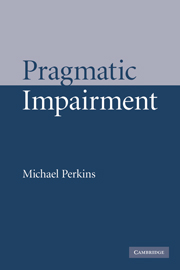Book contents
- Frontmatter
- Contents
- List of figures
- List of tables
- Acknowledgements
- Transcription conventions
- 1 Introduction
- 2 Pragmatic theory and pragmatic impairment
- 3 Pragmatics and modularity: components, dissociations and associations
- 4 Pragmatic ability and disability: an emergentist model
- 5 Cognition and pragmatics
- 6 Language and pragmatics
- 7 Sensorimotor systems and pragmatics
- 8 Compensatory adaptation
- 9 Conclusions
- Appendix
- References
- Index
2 - Pragmatic theory and pragmatic impairment
Published online by Cambridge University Press: 22 September 2009
- Frontmatter
- Contents
- List of figures
- List of tables
- Acknowledgements
- Transcription conventions
- 1 Introduction
- 2 Pragmatic theory and pragmatic impairment
- 3 Pragmatics and modularity: components, dissociations and associations
- 4 Pragmatic ability and disability: an emergentist model
- 5 Cognition and pragmatics
- 6 Language and pragmatics
- 7 Sensorimotor systems and pragmatics
- 8 Compensatory adaptation
- 9 Conclusions
- Appendix
- References
- Index
Summary
Introduction
To date, the study of pragmatic impairments has had virtually no impact on pragmatic theory or on mainstream pragmatics generally. This is a pity. Linguistic communication typically appears to be a single, seamless process, but it is only when it goes wrong that we tend to have any inkling that it is really a complex of interacting processes. Unlike clinicians, who need to understand a condition in its entirety in order to plan appropriate intervention, pragmatic theorists have had the luxury of being able to focus only on the specific features which are of interest to them. It is a contention of this book that a holistic and detailed understanding of pragmatic impairment can make a significant contribution to the study of normal pragmatic behaviour, and that the potential benefits for pragmatic theory are considerable.
In contrast, the impact of pragmatic theory on the study of pragmatic impairment has been extensive. However, despite the increasing clinical application of pragmatic theories over the last couple of decades, our understanding of communication disorders has, as I aim to show, not always been particularly well served by it. This is partly because of the heterogeneity and breadth of pragmatics as a discipline. Thus ‘pragmatic impairment’ and other cognate terms are used to describe an excessively wide range of disparate conditions, and are often used inconsistently.
- Type
- Chapter
- Information
- Pragmatic Impairment , pp. 8 - 32Publisher: Cambridge University PressPrint publication year: 2007
- 1
- Cited by



